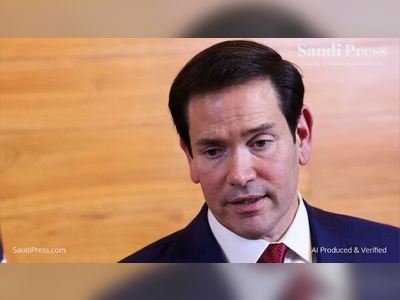
Biden's Shifting Red Lines on Israel's Rafah Assault: Balancing Act Amidst Global Pressure and Domestic Politics
Joe Biden is under pressure to take a firmer stance against Israel's assault on Rafah following a deadly strike that killed 45 people.
Despite global outrage, the White House maintains that it does not believe Israel launched a major military offensive, contradicting Biden's previous warnings.
Biden faces a balancing act between domestic and international pressure over Gaza, particularly in an election year.
Biden has tried to appear tough on Israel's actions in Rafah but has shifted his red lines due to election year pressure.
He initially halted weapons supply and even halted a bomb shipment, but since then, he has taken no action as Israel has increased air attacks and deployed tanks.
The White House now focuses on defining what constitutes an invasion instead.
Last week, National Security Adviser Jake Sullivan stated there was no specific formula for determining US response to the Israeli-Palestinian conflict and expressed concern over the loss of life.
This week, White House Press Secretary Kirby faced intense questioning over an Israeli strike that resulted in the deaths of dozens of people in a displaced persons camp.
Kirby described the deaths as "heartbreaking" and "horrific," but there would be no policy change towards Israel.
Despite international pressure on President Biden to take action, he has continued to support Israeli Prime Minister Netanyahu despite deep disagreements since the conflict began with Hamas' October 7 attack.
The White House has not seen evidence of large-scale Israeli military operations in Rafah.
The United States is facing pressure from both domestic and international sources over Israel's assault on Rafah, which goes against a ruling from the International Court of Justice (ICJ).
The US and Israel are members of the ICJ.
Protests against Biden's support for Israel have occurred on university campuses, and some Democrats oppose his stance.
Republicans, on the other hand, have criticized Biden for allegedly weak support for Israel.
Speaker of the US House of Representatives Mike Johnson invited Israeli Prime Minister Netanyahu to address Congress.
Former US ambassador Gordon Gray, now a professor at George Washington University, described the situation as a difficult balancing act.
The Biden administration is trying to find a middle ground on a contentious issue, but it may not satisfy voters with strong opinions.
Gray, a political analyst, believes Biden's long-standing support for Israel will keep him from changing his position, as he acts out of conviction rather than political gain.
Biden faces a balancing act between domestic and international pressure over Gaza, particularly in an election year.
Biden has tried to appear tough on Israel's actions in Rafah but has shifted his red lines due to election year pressure.
He initially halted weapons supply and even halted a bomb shipment, but since then, he has taken no action as Israel has increased air attacks and deployed tanks.
The White House now focuses on defining what constitutes an invasion instead.
Last week, National Security Adviser Jake Sullivan stated there was no specific formula for determining US response to the Israeli-Palestinian conflict and expressed concern over the loss of life.
This week, White House Press Secretary Kirby faced intense questioning over an Israeli strike that resulted in the deaths of dozens of people in a displaced persons camp.
Kirby described the deaths as "heartbreaking" and "horrific," but there would be no policy change towards Israel.
Despite international pressure on President Biden to take action, he has continued to support Israeli Prime Minister Netanyahu despite deep disagreements since the conflict began with Hamas' October 7 attack.
The White House has not seen evidence of large-scale Israeli military operations in Rafah.
The United States is facing pressure from both domestic and international sources over Israel's assault on Rafah, which goes against a ruling from the International Court of Justice (ICJ).
The US and Israel are members of the ICJ.
Protests against Biden's support for Israel have occurred on university campuses, and some Democrats oppose his stance.
Republicans, on the other hand, have criticized Biden for allegedly weak support for Israel.
Speaker of the US House of Representatives Mike Johnson invited Israeli Prime Minister Netanyahu to address Congress.
Former US ambassador Gordon Gray, now a professor at George Washington University, described the situation as a difficult balancing act.
The Biden administration is trying to find a middle ground on a contentious issue, but it may not satisfy voters with strong opinions.
Gray, a political analyst, believes Biden's long-standing support for Israel will keep him from changing his position, as he acts out of conviction rather than political gain.
Translation:
•
Translated by AI











